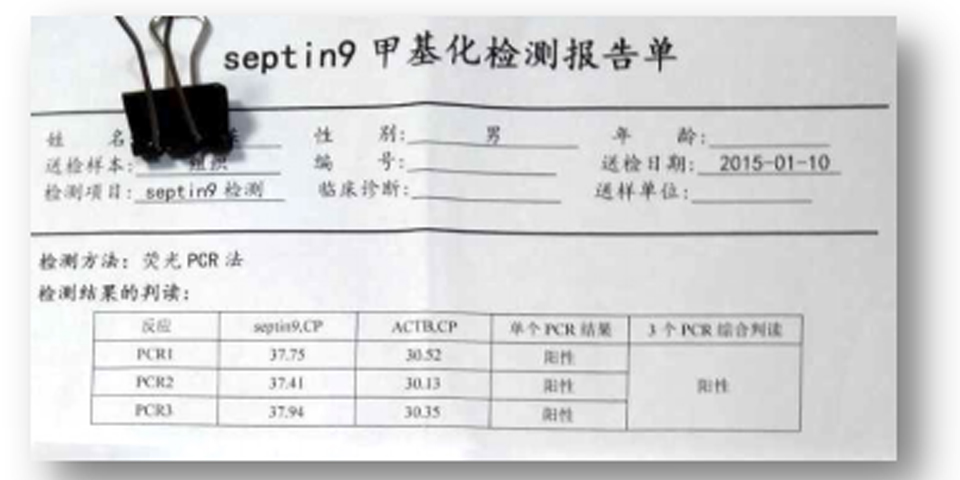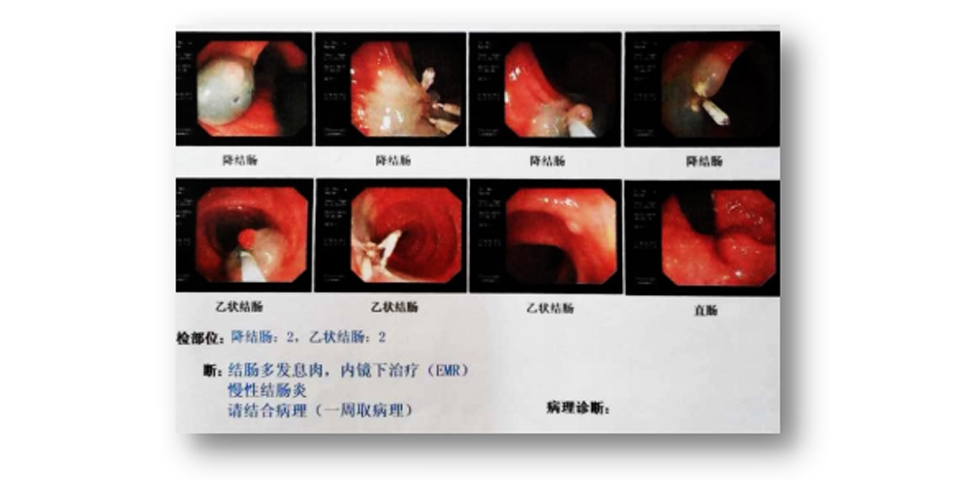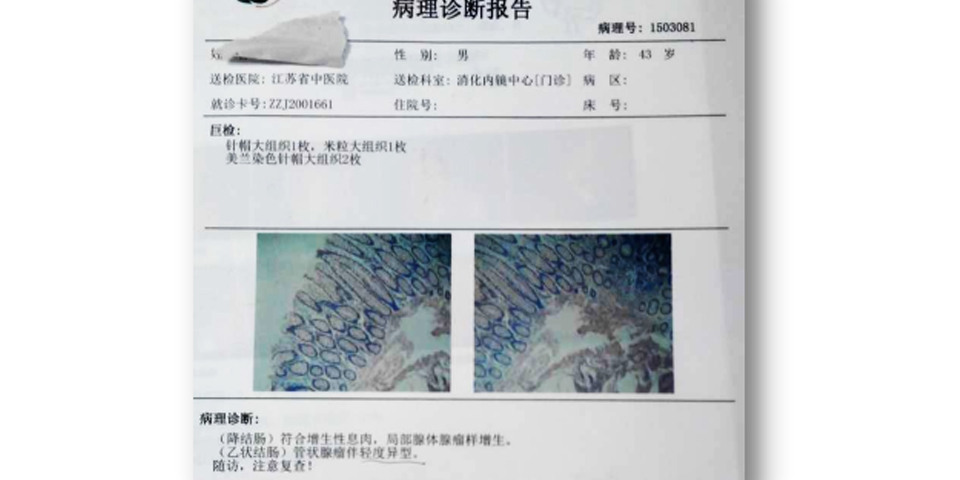Mr. Liang, a citizen of Nanjing, aged 43, is a business employee of a company with a history of smoking. Usually busy at work, frequent business trips and overtime, visiting customers during the day, socializing a lot at night, and irregular work and rest. He also seldom participates in sports on weekdays. In previous years, he participated in the company's routine physical examination, and there was no abnormality.
For a period of time, Mr. Liang found that he felt a little indigestion after a meal, and he was more prone to belching, and his daily bowel movements also changed to some extent. During the most recent medical examination organized by the company, the medical examiner recommended Mr. Liang to undergo a gastroenteroscopic examination based on Mr. Liang's description and medical and surgical examinations.
Mr. Liang came to the hospital and learned that a colonoscopy requires a 1 cm thick and 1.4 m long colonoscopy tube to enter the rectum and large intestine through the anus for observation and examination. He flinched, thinking that his previous physical examination results were all right, and there was no need to endure such pain to perform a digestive tract microscope.
During the routine follow-up of Mr. Liang, the medical examiner found that he did not go for gastroenteroscopy. After listening to Mr. Liang's reason for refusing to go for microscopic examination due to fear of pain, the medical examiner introduced the CFDA-approved Class III liquid biopsy product Changjiu'an? Septin9 methylation assay, which is safe, non-invasive and widely accepted by both Chinese and foreign countries. Recommended by authoritative guidelines and high accuracy and sensitivity, Mr. Liang's previous concerns about gastroenteroscopy were dispelled. Mr. Liang made an appointment for testing through Universal Huakang (Shanghai) Medical Technology Co., Ltd. After several days of waiting, Mr. Liang got the test report. The test report showed that the results of the three repeated experiments were all positive for Septin9 methylation, suggesting the risk of colorectal cancer. Interpretation experts based on the test results and combined with Mr. Liang's physical examination reports and living habits history in recent years, comprehensively recommended colonoscopy.
Mr. Liang conducted a precise colonoscopy screening in Jiangsu Provincial Hospital of Traditional Chinese Medicine through the green medical channel service provided by Pu Shi Huakang (Shanghai) Medical Technology Co., Ltd. The colonoscopy report showed multiple colon polyps in addition to chronic colitis. One week later, the pathological diagnosis report showed hyperplastic polyps of descending colon, adenomatous hyperplasia of local glands, tubular adenoma of sigmoid colon with mild atypia (precancerous lesions, subsequent canceration rate >5%).
Mr. Liang performed high-frequency electrocoagulation resection of colonic polyps under general anesthesia and colonoscopy under the advice of experts, and the postoperative recovery was good. Mr. Liang received a re-examination Septin9 methylation test half a year later and it was negative, and is now regularly followed up every year.
After passing through this near-miss experience, Mr. Liang is very grateful to Microdiag's Changjiuan? products for helping him truly realize the "pre-cancer early warning" of digestive tract cancer and solve his troubles!
2015.01.10 Septin9 methylation detection:
The results of the three repeated experiments were all positive for Septin9 methylation, suggesting the risk of colorectal cancer. Mr. Liang, a citizen of Nanjing, aged 43, is a business employee of a company with a history of smoking. Usually busy at work, frequent business trips and overtime, visiting customers during the day, socializing a lot at night, and irregular work and rest. He also seldom participates in sports on weekdays. In previous years, he participated in the company's routine physical examination, and there was no abnormality.

For a period of time, Mr. Liang found that he felt a little indigestion after a meal, and he was more prone to belching, and his daily bowel movements also changed to some extent. During the most recent medical examination organized by the company, the medical examiner recommended Mr. Liang to undergo a gastroenteroscopic examination based on Mr. Liang's description and medical and surgical examinations.
Mr. Liang came to the hospital and learned that a colonoscopy requires a 1 cm thick and 1.4 m long colonoscopy tube to enter the rectum and large intestine through the anus for observation and examination. He flinched, thinking that his previous physical examination results were all right, and there was no need to endure such pain to perform a digestive tract microscope.
During the routine follow-up of Mr. Liang, the medical examiner found that he did not go for gastroenteroscopy. After listening to Mr. Liang's reason for refusing to go for microscopic examination due to fear of pain, the medical examiner introduced the CFDA-approved Class III liquid biopsy product Changjiu'an? Septin9 methylation assay, which is safe, non-invasive and widely accepted by both Chinese and foreign countries. Recommended by authoritative guidelines and high accuracy and sensitivity, Mr. Liang's previous concerns about gastroenteroscopy were dispelled. Mr. Liang made an appointment for testing through Universal Huakang (Shanghai) Medical Technology Co., Ltd. After several days of waiting, Mr. Liang got the test report. The test report showed that the results of the three repeated experiments were all positive for Septin9 methylation, suggesting the risk of colorectal cancer. Interpretation experts based on the test results and combined with Mr. Liang's physical examination reports and living habits history in recent years, comprehensively recommended colonoscopy.

Mr. Liang conducted a precise colonoscopy screening in Jiangsu Provincial Hospital of Traditional Chinese Medicine through the green medical channel service provided by Pu Shi Huakang (Shanghai) Medical Technology Co., Ltd. The colonoscopy report showed multiple colon polyps in addition to chronic colitis. One week later, the pathological diagnosis report showed hyperplastic polyps of descending colon, adenomatous hyperplasia of local glands, tubular adenoma of sigmoid colon with mild atypia (precancerous lesions, subsequent canceration rate >5%).
Mr. Liang performed high-frequency electrocoagulation resection of colonic polyps under general anesthesia and colonoscopy under the advice of experts, and the postoperative recovery was good. Mr. Liang received a re-examination Septin9 methylation test half a year later and it was negative, and is now regularly followed up every year.
After passing through this near-miss experience, Mr. Liang is very grateful to Microdiag's Changjiuan? products for helping him truly realize the "pre-cancer early warning" of digestive tract cancer and solve his troubles!
2015.01.10 Septin9 methylation detection:
The results of the three repeated experiments were all positive for Septin9 methylation, suggesting the risk of colorectal cancer.

Share to: